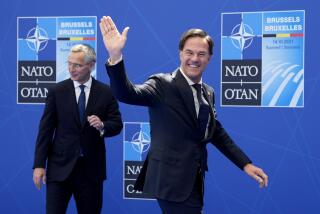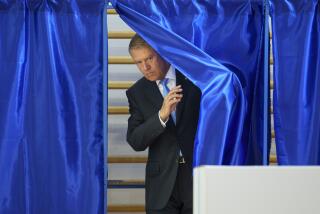NATO Issue Unresolved by Divided Vote in Denmark
- Share via
COPENHAGEN — Voters in Denmark’s parliamentary election Tuesday appeared to give a vote of confidence to the country’s continuing membership in the North Atlantic Treaty Organization.
But they left unsettled a controversy over the alliance’s nuclear weapons. The voting, in which eight different parties gained seats in the Folketing (the Parliament), failed to give a clear majority to parties that are either for or against tightening Denmark’s laws prohibiting nuclear weapons in Danish territory.
The early election was called when opposition members in Parliament passed a resolution April 14 telling the government to inform visiting NATO ship captains that nuclear weapons are banned. Previously, Denmark merely took it for granted that such weapons were not being carried into its territory, without a specific request for compliance with Denmark’s 30-year-old ban on nuclear weapons.
This new phrasing of Denmark’s anti-nuclear policy was deemed unacceptable by the United States and Britain, which have followed a policy of neither confirming nor denying the presence of nuclear weapons on their warships.
The NATO nuclear position was strongly supported by Conservative Prime Minister Poul Schlueter, who called Tuesday’s election, widely viewed as a referendum on whether Denmark would remain a full-fledged member of the Atlantic Alliance.
Schlueter said after the votes were counted that he is not prepared to step down as prime minister but will consult leaders of other parties to see whether he can form a new, stable coalition.
Backs Tougher Wording
His chief opponent, Svend Auken, head of the Social Democrats, said his party will stand by the tougher wording in the anti-nuclear resolution. He called for the prime minister to resign.
Both major groupings in Parliament claimed victory early today, contending that a majority of members in the 179-seat Parliament would support their positions.
But it was difficult to assess these claims because smaller parties in the Parliament often side with or against the government, depending on specific issues, and do not join in a formal government coalition.
Political observers said early today that the whole NATO issue would probably be finessed so that Denmark can continue to call attention to its ban on nuclear weapons in peacetime--without specifically demanding that individual ship captains be informed of the law.
Norway also bans nuclear weapons, but it assumes that a general statement of its policy to its NATO allies is a sufficient reminder.
In the balloting, Prime Minister Schlueter’s Conservative Party lost three seats while the Social Democrats gained one.
But the biggest surprise was the showing by the right-wing Progress Party, which advocates lower taxes and a halt to immigration. It increased its strength to 16 seats from nine.
Since it tends to support a strong defense posture and is pro-NATO, the gain of the Progress Party--though it is not in the government--could offset the Conservative Party’s losses if the NATO nuclear issue comes to a vote.
The Radical Liberal Party, which has cast essential swing votes in the past, lost one seat in the election.
Recent public-opinion samplings have shown that Danes support membership in NATO while they oppose stationing of nuclear weapons on Danish territory and favor a “nuclear-free zone” in the Nordic countries.
Denmark was a founding member of NATO in 1949, and while small in size and population--5.1 million--it occupies a strategically important location covering the approaches to the Baltic Sea.
An estimated 500 Soviet warships pass through Danish straits each year moving from their home ports in the Baltic into the North Sea and the North Atlantic.
More to Read
Sign up for Essential California
The most important California stories and recommendations in your inbox every morning.
You may occasionally receive promotional content from the Los Angeles Times.










